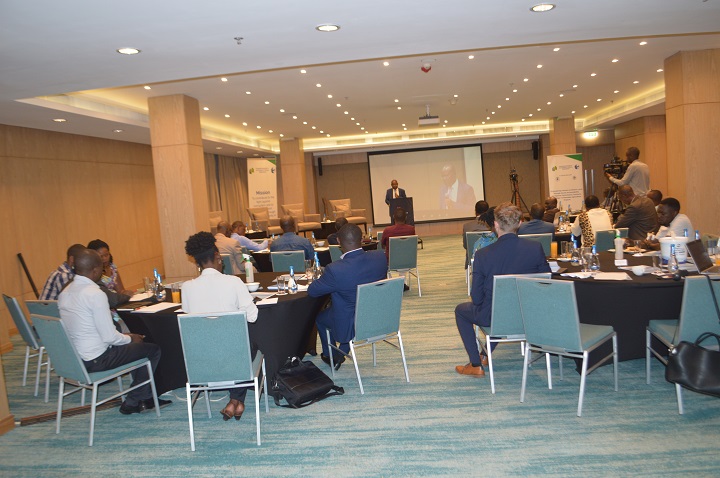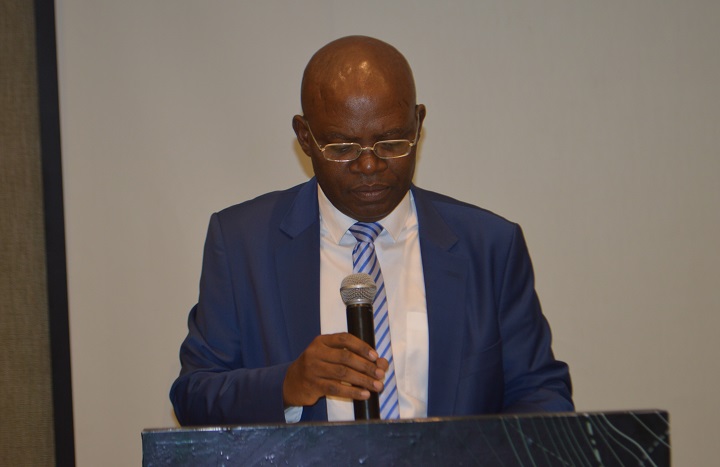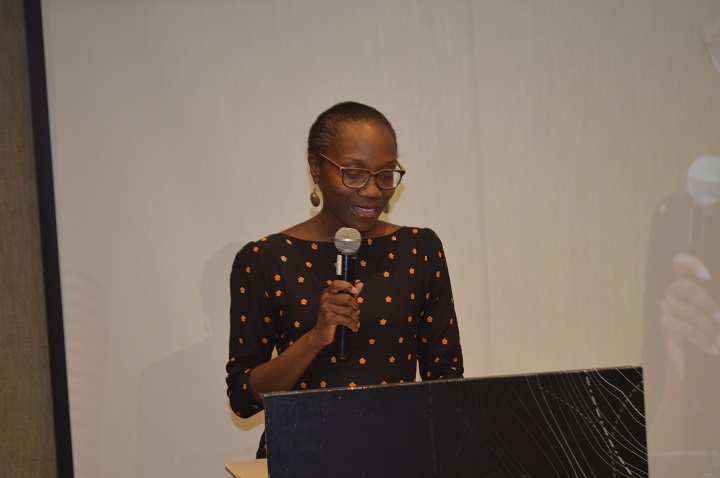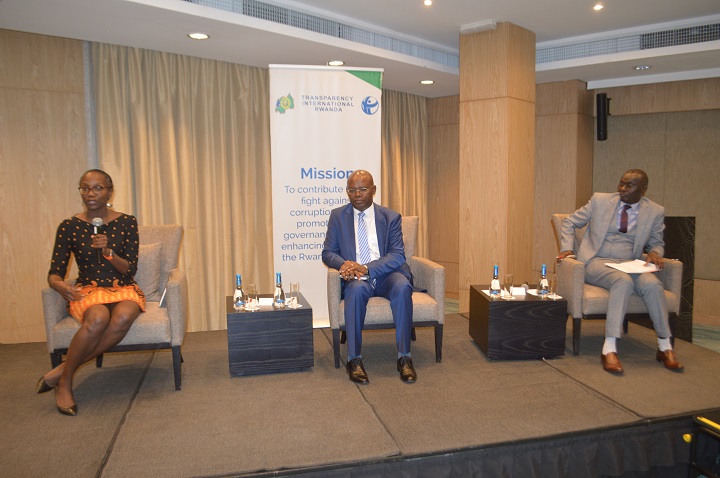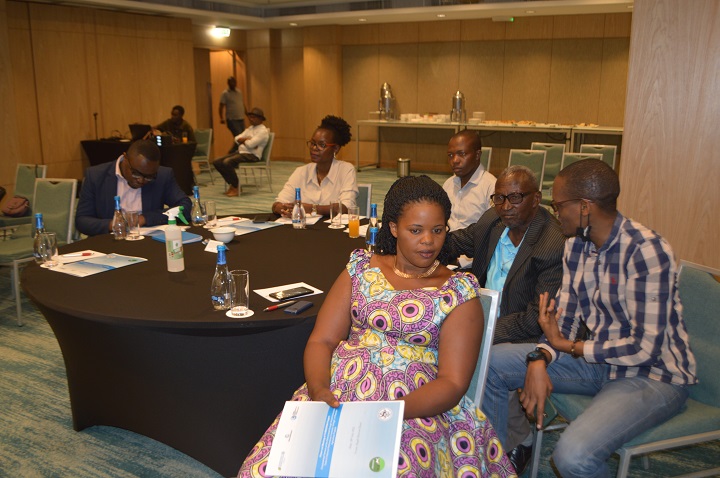TI-RW holds Phase out Meeting of the GPSA Project : Empowering Farmers at the District level through Social Accountability Tools to Improve Performance Contracts “Imihigo” in Rwandan Agriculture projects
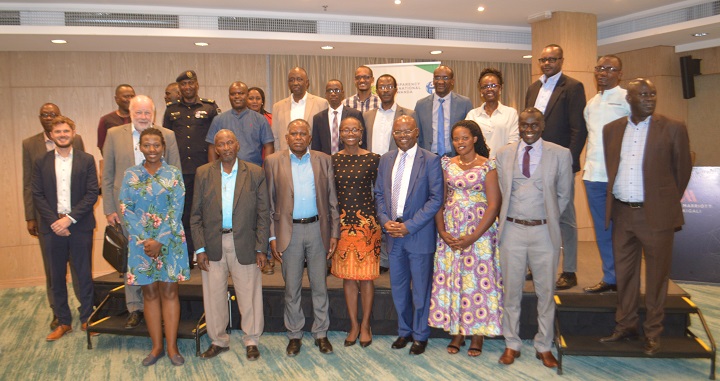
On 28th July 2022, physically at Kigali Marriot Hotel and virtually via Zoom Meeting Platform and YouTube, Transparency International Rwanda (TI-RW) held a Phase out Meeting of the GPSA Project : Empowering Farmers at the District level through Social Accountability Tools to Improve Performance Contracts “Imihigo” in Rwandan Agriculture projects.
The event hosted participants coming from different stakeholder organizations in public and private sector, Civil Society Organizations (CSOs), media practitioners and development partners who have been part of the project implementation. Through this 5-year project implemented since 2017 with the support of the World Bank through Global Partnership for Social Accountability “GPSA”, TI-RW aimed to contribute to addressing low citizen participation in policy planning, monitoring, and evaluation of local and national agricultural development plans in the targeted districts, namely Kayonza and Nyanza.
“World Bank’s interventions in Rwandan agriculture sector has led to tremendous positive change and the sector has significantly improved. We particularly congratulate and thank TI-RW on the successful management & implementation of this project,” said Rolande Pryce World Bank Country Manager, Rwanda Office.
In his introductory remarks, TI-RW Executive Director Apollinaire Mupiganyi commended all stakeholders behind the GPSA project’s success in Rwanda and underscored that TI-RW contributed to leveraging social accountability and citizen participation in agricultural plans at both local and national level.
“In the light of the project’s achievements, Transparency International Rwanda celebrates that farmers have been empowered to participate in their district’s Imihigo planning, implementation and evaluation in the targeted districts, namely Nyanza and Kayonza Districts,” Mupiganyi added.
The Guest of Honor, Dr Octave Semwaga, the Director General for Agriculture Modernization at the Ministry of Agriculture (MINAGRI) underpinned that the ministry is "committed to increasing the level of farmers’ participation" in planning and budgeting processes starting from grassroot level.
"The successful implementation of TI-Rwanda/GPSA project underpins how we need even more projects like this and we wish the methodology used continues in other districts countrywide," Dr. Semwaga added.
“The work in Rwanda demonstrates the value of collaborative social accountability. This project has made strides in creating mechanisms and avenues for citizens to engage with policymakers,” testified Jeff Thindwa the GPSA Program Manager in his Word of Thought.
“As you promote accountability, the capacity of government to respond very often we think they are not transparent, they are not responsive and compliant simply because they do not want to be. One of the things I see across the board is government has jobs just like Civil Society – they are often overwhelmed, often mechanisms to promote accountability do not exist, often means of responding just human resources are not sufficient or equipped to respond and often when it comes to compliance they have a lot of constraints. That’s why we should help improving they capacity.” Rosemary Rop, Senior Social Accountability Consultant, GPSA.
Background
Since 2017, Transparency International Rwanda (TI-Rw), with the support of the World Bank through Global Partnership for Social Accountability “GPSA”, implemented the above-mentioned project with the aim to contribute to addressing low citizen participation in policy planning, monitoring, and evaluation of local and national agricultural development plans in the targeted districts, namely Kayonza and Nyanza.
Specifically, TI-RW wished to increase farmers’ participation in the planning phase of the district performance contracts “Imihigo” ; strengthen the cooperation between CSOs and government officials for enhanced effectiveness of agricultural projects ; and share knowledge and lesson learnt. In so doing, TI-RW implemented the above-mentioned project in partnership with two other local Civil Society Organizations namely Imbaraga Farmers` Association and SDA-Iriba in Kayonza and Nyanza districts respectively.
Rwanda uses the performance-based contracts referred to as ‘Imihigo’ as one of the means to attain agriculture sector development. The Imihigo have a strong focus on results, which makes it an invaluable tool in the planning, accountability, monitoring and evaluation processes. To turn farmers’ priorities planned in Imihigo into the reality, the entire process should be accompanied by quick and operative service delivery process that promotes accountability of service providers, feedback to citizens and participation of citizens. At this juncture, in the last five (5) years, TI-RW has built the capacity of farmers to enable them to actively participate in imihigo planning, implementation and monitoring in Nyanza and Kayonza districts.
This project had a total of 7,476 farmers as the direct beneficiaries (women count 51%) who are members of 128 and 130 farmers’ groups created in Kayonza and Nyanza respectively. For the past five (5) years in both Nyanza and Kayonza, farmers submitted 141 priorities among which 53 were included in Imihigo. Moreover, to generate information on social relevance, costs, and the use of public funds in the above-mentioned implemented priorities in agriculture, six (6) projects were monitored (Nyanza and Kayonza) through social audit. The monitored projects were Milk Collection Centers electrification project, Rwinkwavu Marshland and Kabarondo Terrace project in Kayonza ; Input use project, Mukingo and Cyabakamyi Terraces projects in Nyanza.
The main objective of the GPSA Project Phase out meeting was to showcase the experiences, achievements realized and lessons learnt over the past five years vis-à-vis the expected results and challenges encountered during the project implementation ; and bring on the table of discussions relevant stakeholders to deliberate over the way forward towards sorting out identified challenges. The event, therefore, was an impetus to deepening cooperation between CSOs and government officials, as well as with farmers through enhancing everyone`s engagement by sharing information and establishing strategies to lessen challenges faced by farmers.
